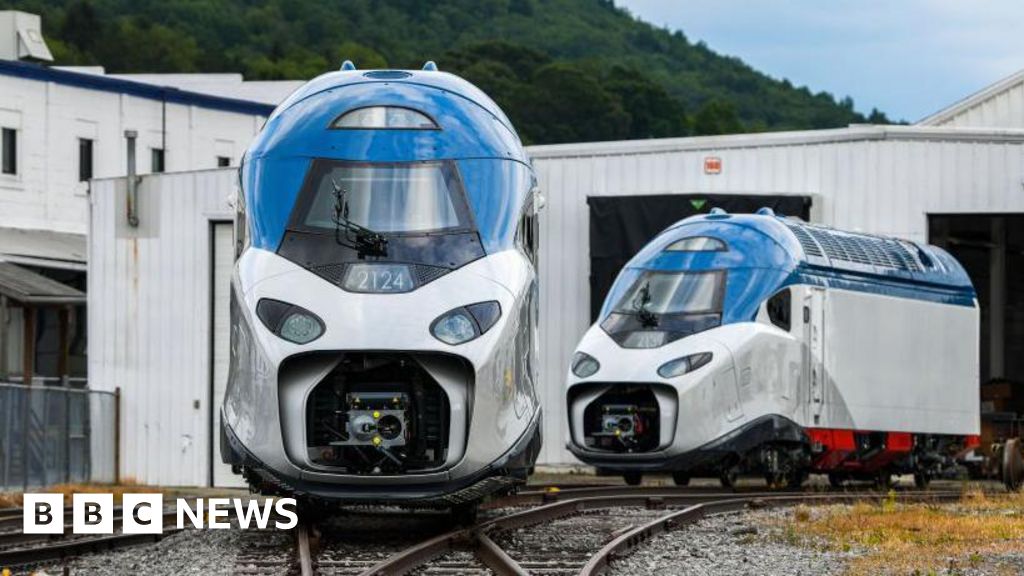ARTICLE AD BOX
Drivers need better incentives to buy electric to help manufacturers meet the government's 2030 petrol and diesel ban, the UK car industry has demanded.
The Society of Motor Manufacturers and Traders (SMMT) said support packages were needed to make the electric vehicles (EV) switch more attractive and affordable.
It comes as figures reveal EV production dropped 7.6% in the first half of 2024.
The new Labour government has pledged to restore the petrol and diesel ban to 2030, after previous prime minister Rishi Sunak pushed it back to 2035.
Car firms across the world have been changing their production lines as governments try to persuade people to drive greener cars to meet environmental targets.
SMMT chief executive Mike Hawes said UK firms were split over whether restoring the 2030 deadline was a good or bad plan.
When the Conservative government delayed the policy in September last year, Ford said the move undermined its electric car investment plans.
However, Toyota said the decision was "pragmatic".
Mr Hawes said it was "wrong to get hung up" on the shift back to 2030, but said specific details on which new vehicles would be banned remained unclear.
"The devil is in the detail. Is that a complete end of everything that has a tail pipe?," he said.
"Or is there a degree of flexibility that would allow different technologies such as plug-in hybrid? If it was a really strict.... a lot of manufacturers would struggle to comply in that timescale and that wouldn't be good for the consumer."
Regardless of when a ban on sales of new petrol and diesel cars is brought in, most people will not be affected immediately as the majority of drivers buy vehicles second-hand.
But people wanting to go green earlier have been met with steep costs for doing so, with the average cost to buy an electric car in the UK amounting to around £48,000.
The SMMT has argued car-makers have been mandated to build more electric cars and hit growing EV sales targets each year, but the rhetoric to switch in recent years and incentives for consumers has not been strong enough.
Mr Hawes claimed it was currently "extremely expensive to sell EVs in the because you have no incentives" which had caused an "affordability gap".
"Consumers respond to carrots not sticks and we are seeing that at the moment," he added.
He said three incentives would help drive up demand for EVs:
- Cut VAT charged on EV sales for three years by half
- Exempt EV vehicles from an expensive car supplement duty which applies to cars valued more than £40,000
- Bring public charging costs for EVs in line with rates paid for home-charging
In response to the calls, a the Department for Transport said the government would "set out further details" on the ban "in due course", but confirmed it intends to restore the 2030 phase-out date.
"This government is committed to delivering greener transport by supporting the transition to electric vehicles," it added.
Phasing out fossil-fuel-powered cars is central to the UK government's plan to meet its climate goals and reaching net zero by 2050, which if achieved would be the point at which the country is no longer adding to the overall amount of harmful greenhouse gases in the atmosphere.
But after years of soaring sales, growth appears to have stalled.
In the first six months of this year, electric car production declined 7.6% compared to the same period last year. Overall vehicle manufacturing also dropped.
The SMMT, which released the data, said the fall was "expected" as car makers overhaul lines to make electrified models.
The European Union continued to take the majority of car exports (55.4%).
Following talks between the EU and China over electric car tariffs, the UK's position is still not known on the potential cheaper imports.
Mr Hawes said the UK car industry had "always been open to new entrants", highlighting Japanese car firms Nissan, Honda and Toyota who had invested in plants.
"There is a lot of economic benefits to be gained from investment," he added.

 9 months ago
34
9 months ago
34








 English (US) ·
English (US) ·